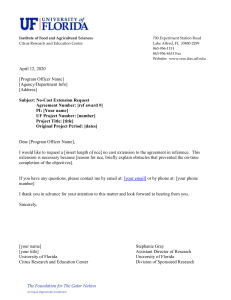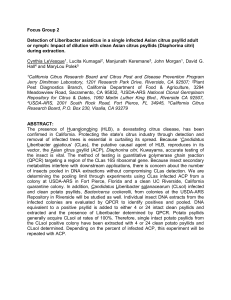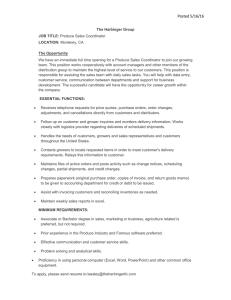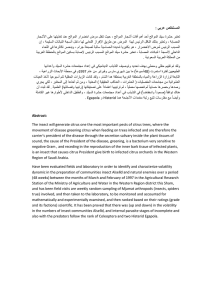March 2009 - Florida Citrus Mutual
advertisement
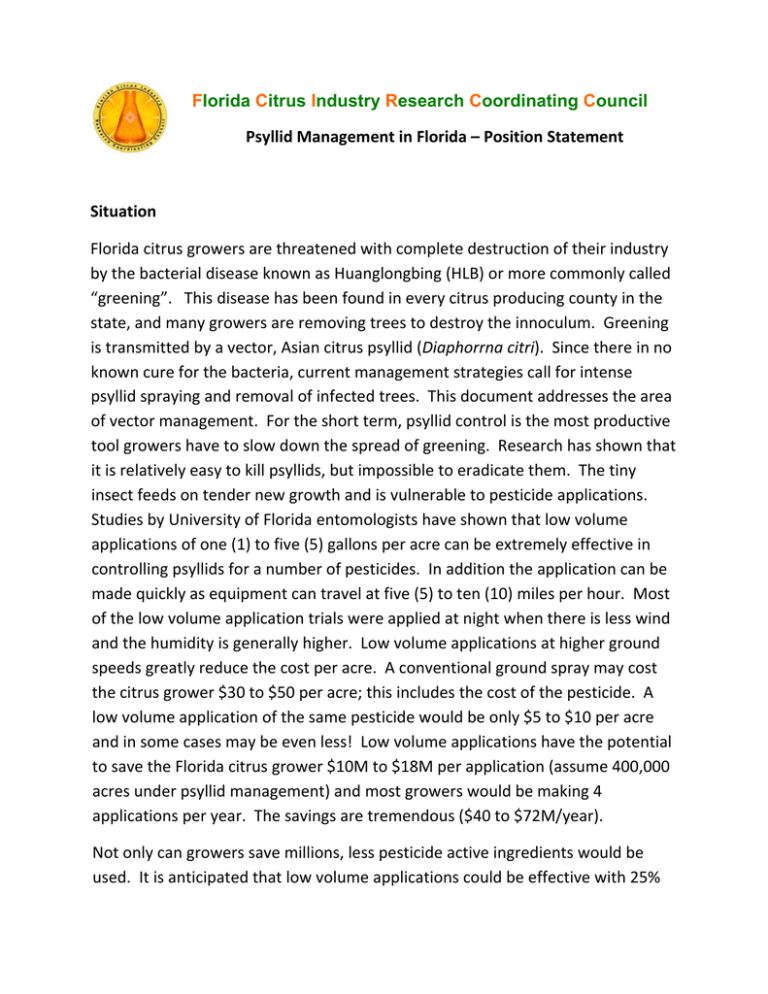
Florida Citrus Industry Research Coordinating Council Psyllid Management in Florida – Position Statement Situation Florida citrus growers are threatened with complete destruction of their industry by the bacterial disease known as Huanglongbing (HLB) or more commonly called “greening”. This disease has been found in every citrus producing county in the state, and many growers are removing trees to destroy the innoculum. Greening is transmitted by a vector, Asian citrus psyllid (Diaphorrna citri). Since there in no known cure for the bacteria, current management strategies call for intense psyllid spraying and removal of infected trees. This document addresses the area of vector management. For the short term, psyllid control is the most productive tool growers have to slow down the spread of greening. Research has shown that it is relatively easy to kill psyllids, but impossible to eradicate them. The tiny insect feeds on tender new growth and is vulnerable to pesticide applications. Studies by University of Florida entomologists have shown that low volume applications of one (1) to five (5) gallons per acre can be extremely effective in controlling psyllids for a number of pesticides. In addition the application can be made quickly as equipment can travel at five (5) to ten (10) miles per hour. Most of the low volume application trials were applied at night when there is less wind and the humidity is generally higher. Low volume applications at higher ground speeds greatly reduce the cost per acre. A conventional ground spray may cost the citrus grower $30 to $50 per acre; this includes the cost of the pesticide. A low volume application of the same pesticide would be only $5 to $10 per acre and in some cases may be even less! Low volume applications have the potential to save the Florida citrus grower $10M to $18M per application (assume 400,000 acres under psyllid management) and most growers would be making 4 applications per year. The savings are tremendous ($40 to $72M/year). Not only can growers save millions, less pesticide active ingredients would be used. It is anticipated that low volume applications could be effective with 25% less product being used. Field studies will need to be implemented to verify the actual numbers. Another psyllid management option is the treatment of large areas with aerial applications. Since the psyllid is relatively easy to kill, many think sprays that control mosquitoes may also kill the greening vector. Research will be conducted during 2009 to evaluate the effectiveness of aerial sprays on psyllids. If the results are positive, thousands of acres could be treated quickly. Even more important, large area applications greatly reduce migrations of psyllids from abandoned or poorly managed groves. There is even talk of an industry wide treatment using large planes that could complete the application in a matter of days. Having the ability to spray large areas by air can be a valuable tool to manage the psyllid. Both low volume applications and aerial spraying of large areas will supplement the standard ground sprays most growers use to combat other pests in addition to the psyllid. An all out attack on the citrus psyllid is necessary to buy growers time in their battle with greening. They must slow down the spread until scientists find more effective methods to deal with greening. Most feel the ultimate solution will be through tolerant trees, but it takes time to engineer plants that can resist or tolerate the greening bacteria. Actions Needed Several action items need to be implemented immediately. A sound psyllid management program must be research based. Scientists must obtain efficacy data for a number of pesticides applied in multiple methods. They must evaluate standard ground applications of 50 to 150 gallons per acre (gpa), low volume sprays of 2 to 10 gpa, and aerial applications of less than 2 gpa. Once we know what materials will kill the psyllid in all three methods of application, then appropriate labels must be obtained to allow for legal applications. Currently many products do not have labels that allow low volume or aerial applications. However, several products do have mosquito control labels raising the question “how can it be legal to spray residential areas, but not a citrus grove!” Once the research has been done, 24(c) labels must be obtained to allow growers to use safe and effective products by air and through low volume applications. Currently manufacturers have obtained 24(c) labels for Danitol, Delegate and Micromite. Mustang is in the review process with the Florida Department of Agriculture and should receive their 24(c) label during the summer of 2009. The IR‐4 project is closely involved with the process. The goal is to obtain state 24(c) low volume (2 gpa) labels for the 4 products in 2009. Scientists feel the varied chemistry should minimize the chance of resistance. As mentioned earlier, growers feel they can reduce the active ingredient applied through low volume sprays. The citrus industry hopes other manufacturers will move forward to obtain 24(c) labels for their products. Aerial application research is under way. Experimental Use Permits have been obtained for Dantitol and Mustang. They will be evaluated and if effective, 24 (c) labels will be sought. Currently several large area aerial sprays have been applied with great success. An all our effort will be undertaken to treat as many citrus trees as possible by air. USDA‐APHIS will be asked to assume the responsibility for large area applications. Currently many growers are looking at low volume applications. In order to move as quickly as possible in this direction, information from research done in the area of mosquito control application equipment needs to be imported. USDA‐ARS has been asked to spearhead this effort. Citrus growers need as much help possible to select the best suited application equipment available. Review and Summary The Florida citrus grower is literally fighting to survive. Greening is being spread from tree to tree and grove to grove by the Asian citrus psyllid. The primary short term management plan is to control this vector. A radical change in the citrus pest management strategy must take place. Multiple applications are needed to keep the psyllid populations low. Growers cannot afford to exclusively use conventional ground applications to manage the psyllid. Fortunately much more economical applications methods have been proven to be effective. In order to take advantage of low volume applications and aerial sprays, label changes must be made and emergency measures enacted. Low volume ground applicators must be efficient and effective. The Environmental Protection Agency and the Florida Department of Agriculture and Consumer Services must work with the Florida citrus grower if the industry is to survive. Time is not on the side of the grower, the following actions must be taken immediately • Obtain 24(c) labels for Danitol (done), Delegate (done), Mustang and Micromite (done) to allow for low volume ground applications (2 gpa). IR‐4 will work on this effort • Obtain 24 (c) labels for a number of other products to allow growers to manage psyllids more effectively. Growers need changes in gallons per acre application rate – no change in active ingredient rates until research shows lower rates can be effective in low volume applications. Asking for 2 gpa. Greening Task Force will provide letter of support. • Determine what products can effectively control psyllids when applied by air – UF/IFAS will do the work • Have APHIS become engaged in large area aerial applications • Have USDA‐ARS provide assistance with evaluation and selection of low volume ground applicators. Also utilize USDA‐ARS to help with effectiveness of aerial sprays (accomplished – now we have to determine plan of action). John Jackson March 2009 Appendix A – List of Labeled Products that need to explore 24c labels for low volume/aerial application. These are the trade names listed in the 2009 Florida Citrus Pest Management Guide for those products that control the Asian citrus psyllid. Lorsban Imidan Movento Couraze Nuprid Pasada Provado
